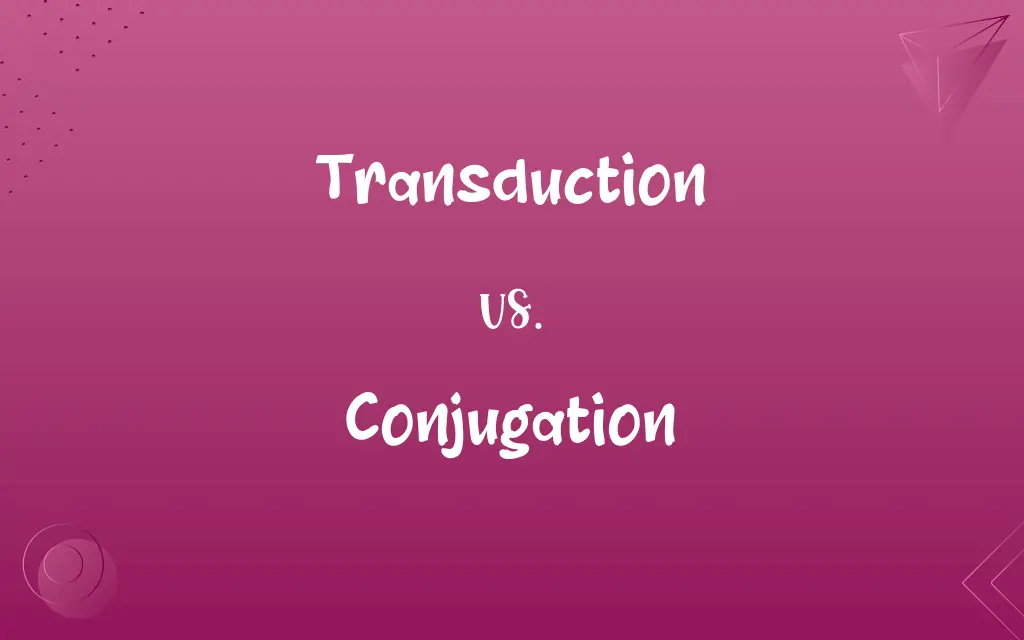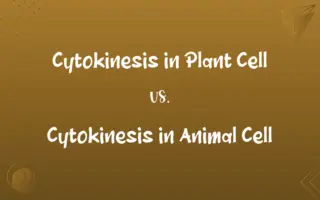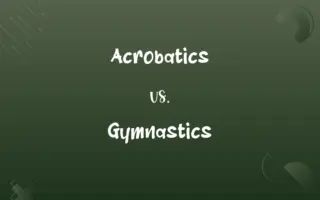Transduction vs. Conjugation: Know the Difference

By Shumaila Saeed || Updated on December 25, 2023
Transduction involves the transfer of genetic material by viruses from one bacterium to another, while conjugation is the direct transfer of DNA between bacteria through direct cell-to-cell contact.

Key Differences
Transduction involves the transfer of DNA from one bacterium to another via a bacteriophage, a type of virus that infects bacteria. It's a form of genetic exchange that doesn't require direct contact between cells. Conjugation, on the other hand, is a more direct method where two bacteria form a physical bridge-like structure called a pilus, through which genetic material, typically a plasmid, is transferred directly from one bacterial cell to another.
Shumaila Saeed
Nov 20, 2023
The process of Transduction is mediated by a virus, which accidentally incorporates a segment of bacterial DNA during its assembly in a host cell and then carries this DNA to another bacterial cell. This allows for genetic recombination and variation. Conjugation, however, is a more controlled process, often initiated by the presence of specific nutrients or environmental conditions, where a donor bacterium transfers part of its DNA to a recipient.
Shumaila Saeed
Nov 20, 2023
In Transduction, the DNA transferred can be random, depending on which part of the bacterial genome was accidentally packaged into the virus. This randomness can lead to a diverse range of genetic combinations. In Conjugation, the DNA transferred is usually a specific plasmid, which often contains beneficial genes like antibiotic resistance, offering a more targeted approach to genetic exchange.
Shumaila Saeed
Nov 20, 2023
Transduction can occur between different bacterial species, facilitating a wider exchange of genetic material. This can lead to significant genetic changes and evolution in bacterial populations. Conjugation, while also occurring between different species, is more common within the same species, which makes it a mechanism for spreading specific traits, like drug resistance, within a bacterial community.
Shumaila Saeed
Nov 20, 2023
Transduction is often a less frequent event compared to Conjugation because it depends on the presence and lifecycle of a bacteriophage. Conjugation is a more regular event in bacterial colonies, as it only requires the presence of a donor and a recipient cell, making it a more consistent means of gene transfer among bacteria.
Shumaila Saeed
Nov 20, 2023
ADVERTISEMENT
Comparison Chart
ADVERTISEMENT
Transduction and Conjugation Definitions
Transduction
Transfer of genetic material from one bacterium to another via a virus.
In transduction, a bacteriophage can transfer antibiotic resistance genes from one bacterial strain to another.
Shumaila Saeed
Nov 20, 2023
Conjugation
Direct DNA transfer between bacteria via cell-to-cell contact.
In conjugation, a donor bacterium transfers a plasmid to a recipient, conferring new traits.
Shumaila Saeed
Nov 20, 2023
Transduction
A process where a virus transfers DNA between bacteria.
Transduction played a crucial role in spreading the gene for penicillin resistance among pathogenic bacteria.
Shumaila Saeed
Nov 20, 2023
Conjugation
The exchange of genetic material between bacteria through a pilus.
Conjugation allows for the sharing of beneficial genes, such as those providing resistance to toxins.
Shumaila Saeed
Nov 20, 2023
Transduction
A method of horizontal gene transfer in bacteria mediated by bacteriophages.
The occurrence of transduction enables bacteria to acquire new traits rapidly, like toxin production.
Shumaila Saeed
Nov 20, 2023
ADVERTISEMENT
Transduction
The introduction of foreign DNA into a cell by a virus.
Genetic researchers often use transduction to insert new genes into bacterial cells.
Shumaila Saeed
Nov 20, 2023
Transduction
The conversion of input energy of one form into output energy of another form.
Shumaila Saeed
Oct 19, 2023
Conjugation
A presentation of the complete set of inflected forms of a verb.
Shumaila Saeed
Oct 19, 2023
Transduction
The transfer of genetic material from one cell to another, especially a bacterial cell, through the use of a bacteriophage.
Shumaila Saeed
Oct 19, 2023
Transduction
(biology) The transfer of genetic material from one cell to another typically between bacterial cells, and typically via a bacteriophage or pilus.
Shumaila Saeed
Oct 19, 2023
Conjugation
The temporary union of two bacterial cells during which one cell transfers part or all of its genome to the other.
Shumaila Saeed
Oct 19, 2023
Transduction
The process whereby a transducer converts energy from one form to another.
Shumaila Saeed
Oct 19, 2023
Transduction
(physiology) The conversion of a stimulus from one form to another.
Shumaila Saeed
Oct 19, 2023
Conjugation
(grammar) In some languages, one of several classifications of verbs according to what inflections they take.
Shumaila Saeed
Oct 19, 2023
Transduction
(physics) The conversion of energy (especially light energy) into another form, especially in a biological process such as photosynthesis or in a transducer.
Shumaila Saeed
Oct 19, 2023
Transduction
(logic) Particularly in the discipline of artificial intelligence, a form of inference, according to which the response appropriate to a particular known case, also is appropriate to another particular case diagnosed to be functionally identical. This contrasts with induction, in which general rules derived from past observations are applied to future cases as a class (compare also analogy).
Shumaila Saeed
Oct 19, 2023
Conjugation
(grammar) The product of that act: the conjugated forms of a verb, collected into a list or recitation.
Principal parts
Shumaila Saeed
Oct 19, 2023
Transduction
(logic design) The improvement of an electronic logic network by reduction of redundant components in an initial version, using an established pruning procedure, then applying permissible functions for transformation of the network into a workable form. Thereafter the transformation and reduction may be repeated till no worthwhile further improvement results.
Shumaila Saeed
Oct 19, 2023
Conjugation
(chemistry) A system of delocalized orbitals consisting of alternating single bonds and double bonds
Shumaila Saeed
Oct 19, 2023
Conjugation
(mathematics) A mapping sending x to gxg-1, where g and x are elements of a group; inner automorphism
Shumaila Saeed
Oct 19, 2023
Transduction
(genetics) the process of transfering genetic material from one cell to another by a plasmid or bacteriophage
Shumaila Saeed
Oct 19, 2023
Conjugation
(mathematics) A function which negates the non-real part of a complex or hypercomplex number; complex conjugation
Shumaila Saeed
Oct 19, 2023
Transduction
The process whereby a transducer accepts energy in one form and gives back related energy in a different form;
The transduction of acoustic waves into voltages by a microphone
Shumaila Saeed
Oct 19, 2023
Conjugation
The act of uniting or combining; union; assemblage.
Mixtures and conjugations of atoms.
Shumaila Saeed
Oct 19, 2023
Transduction
A viral-mediated transfer of genetic information in bacteria.
Transduction is a key factor in the genetic diversity observed in bacterial populations.
Shumaila Saeed
Nov 20, 2023
Conjugation
Two things conjoined; a pair; a couple.
The sixth conjugations or pair of nerves.
Shumaila Saeed
Oct 19, 2023
Conjugation
The act of conjugating a verb or giving in order its various parts and inflections.
Shumaila Saeed
Oct 19, 2023
Conjugation
The act of pairing a male and female for reproductive purposes;
The casual couplings of adolescents
The mating of some species occurs only in the spring
Shumaila Saeed
Oct 19, 2023
Conjugation
The act of making or becoming a single unit;
The union of opposing factions
He looked forward to the unification of his family for the holidays
Shumaila Saeed
Oct 19, 2023
Conjugation
A process where bacteria transfer genetic material through direct contact.
Bacterial conjugation is often responsible for the rapid spread of antibiotic resistance.
Shumaila Saeed
Nov 20, 2023
Conjugation
A form of genetic transfer involving physical connection between bacterial cells.
Scientists observed conjugation between two bacterial species, leading to increased antibiotic resistance.
Shumaila Saeed
Nov 20, 2023
Repeatedly Asked Queries
Is conjugation a form of reproduction?
No, it's a form of genetic exchange, not reproduction.
Shumaila Saeed
Nov 20, 2023
Can transduction occur in all bacteria?
Transduction can occur in many, but not all, bacteria, depending on the presence of compatible bacteriophages.
Shumaila Saeed
Nov 20, 2023
What is transduction in bacteria?
It's the transfer of genetic material between bacteria via a bacteriophage.
Shumaila Saeed
Nov 20, 2023
What roles do transduction and conjugation play in antibiotic resistance?
Both can spread antibiotic resistance genes among bacteria, with conjugation being more direct and common.
Shumaila Saeed
Nov 20, 2023
Do transduction and conjugation require living cells?
Yes, both processes require living bacterial cells to occur.
Shumaila Saeed
Nov 20, 2023
Is a pilus always involved in conjugation?
Yes, a pilus is typically involved in bacterial conjugation.
Shumaila Saeed
Nov 20, 2023
How does bacterial conjugation work?
It involves direct cell-to-cell contact for the transfer of DNA, usually through a pilus.
Shumaila Saeed
Nov 20, 2023
Can transduction transfer any part of the bacterial genome?
Yes, it can transfer random segments of the bacterial genome.
Shumaila Saeed
Nov 20, 2023
Is conjugation limited to certain bacterial species?
It can occur between different species, but is more common within the same species.
Shumaila Saeed
Nov 20, 2023
Is conjugation a frequent event in bacteria?
Yes, it's relatively common in bacterial populations.
Shumaila Saeed
Nov 20, 2023
Can transduction introduce foreign DNA into bacteria?
Yes, it can introduce foreign DNA from different bacterial species.
Shumaila Saeed
Nov 20, 2023
Is transduction a controlled process?
No, it's more random and depends on the life cycle of bacteriophages.
Shumaila Saeed
Nov 20, 2023
How significant is conjugation in bacterial evolution?
It's significant, as it enables rapid adaptation and evolution within bacterial communities.
Shumaila Saeed
Nov 20, 2023
Can transduction occur without a virus?
No, a virus (bacteriophage) is essential for transduction.
Shumaila Saeed
Nov 20, 2023
Does conjugation occur naturally?
Yes, it's a natural process in bacterial colonies.
Shumaila Saeed
Nov 20, 2023
What triggers conjugation in bacteria?
It's often triggered by environmental factors or the presence of specific nutrients.
Shumaila Saeed
Nov 20, 2023
Does transduction require cell-to-cell contact?
No, it doesn't require direct contact between cells.
Shumaila Saeed
Nov 20, 2023
How does conjugation affect bacterial populations?
It increases genetic diversity and can spread beneficial traits rapidly.
Shumaila Saeed
Nov 20, 2023
Can transduction be used in genetic engineering?
Yes, it's used to introduce new genes into bacterial cells.
Shumaila Saeed
Nov 20, 2023
Can transduction occur between distant bacterial species?
Yes, it can facilitate gene transfer across different species.
Shumaila Saeed
Nov 20, 2023
Share this page
Link for your blog / website
HTML
Link to share via messenger
About Author
Written by
Shumaila SaeedShumaila Saeed, an expert content creator with 6 years of experience, specializes in distilling complex topics into easily digestible comparisons, shining a light on the nuances that both inform and educate readers with clarity and accuracy.































































